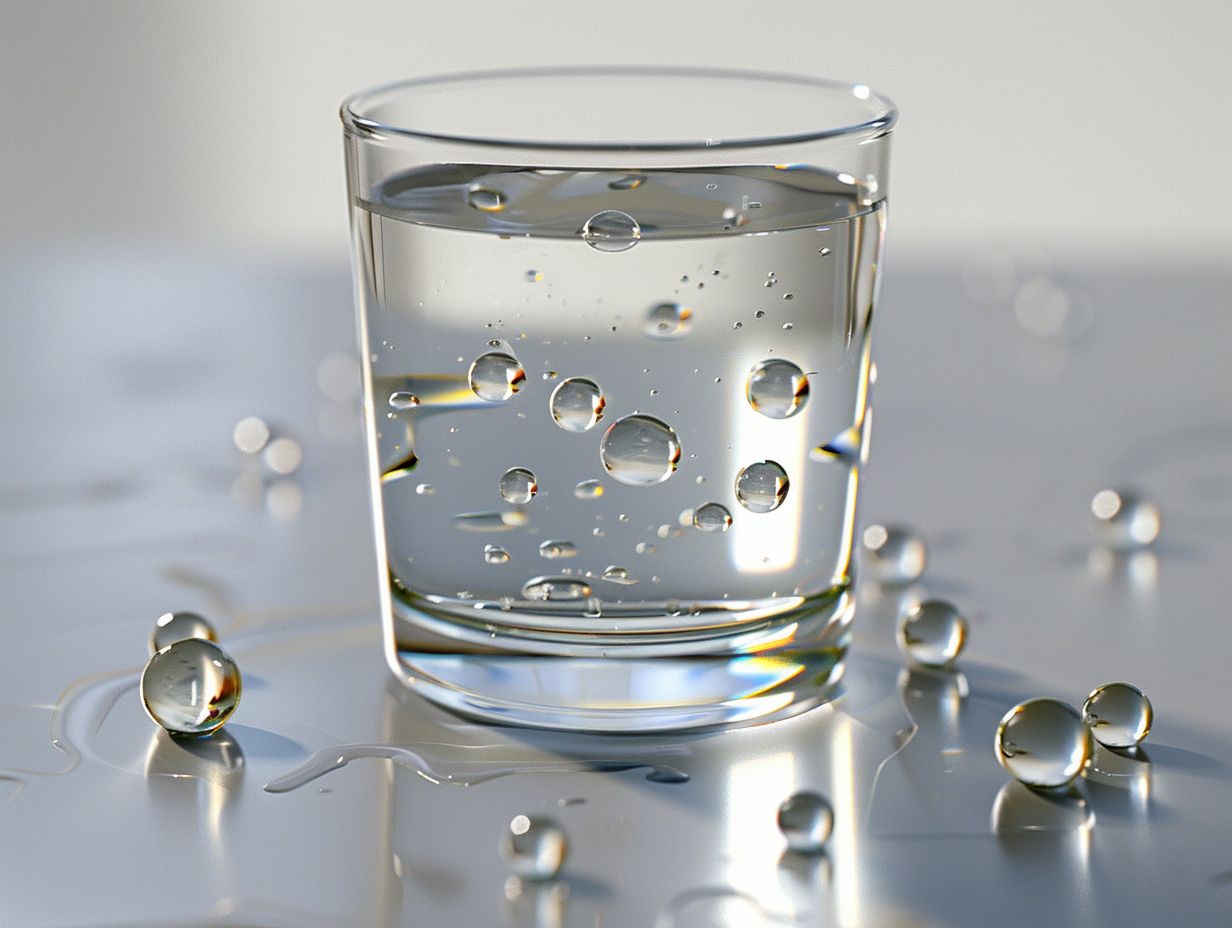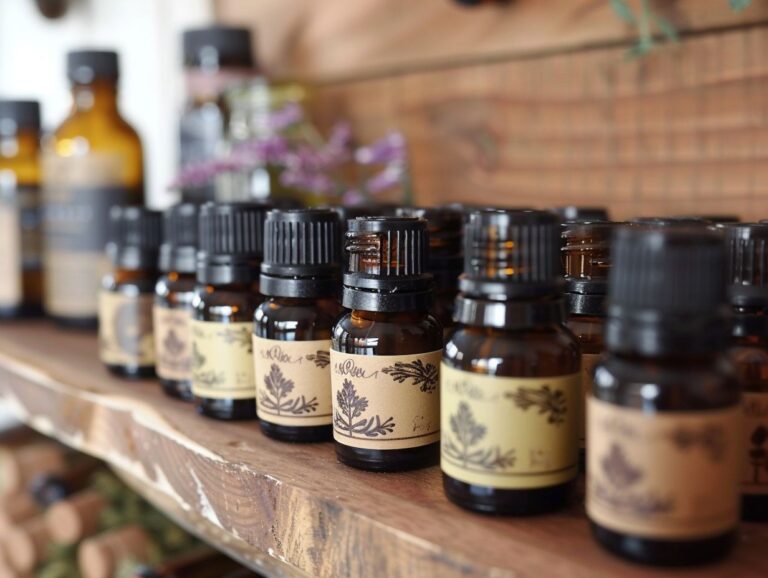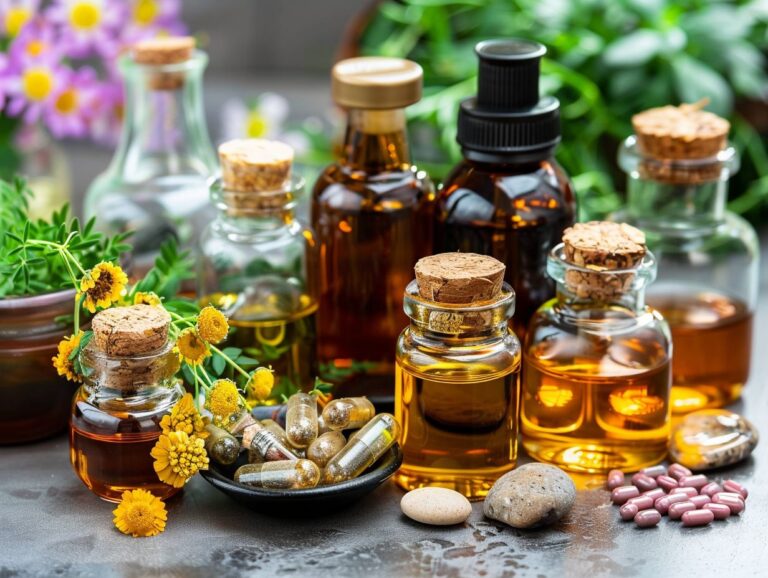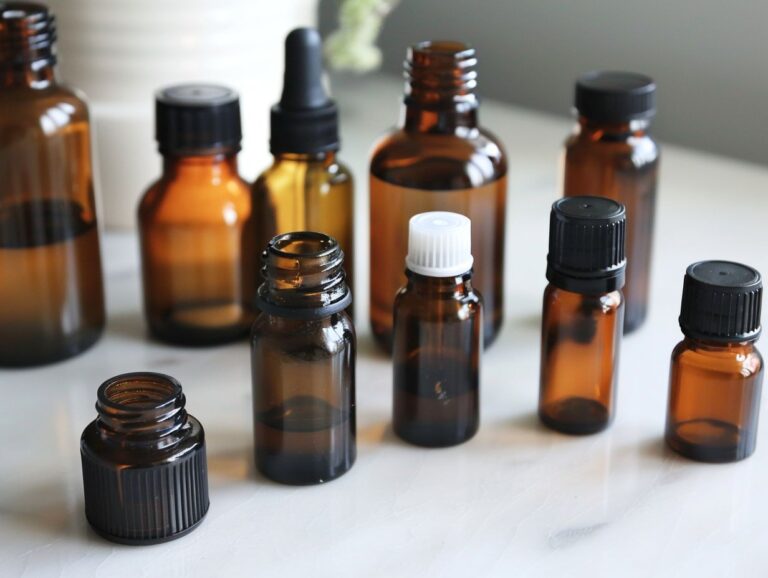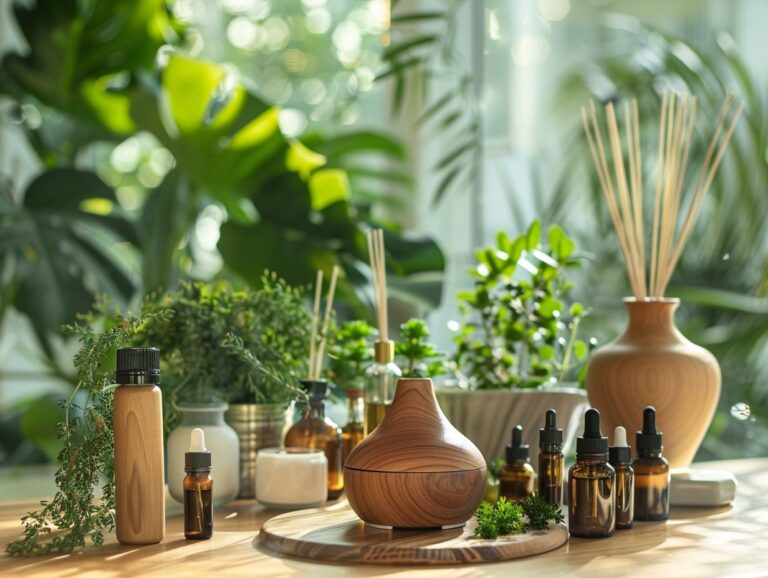Can You Put Essential Oils in Your Water to Drink
If you’ve ever wondered about the benefits and safety of ingesting essential oils, you’re not alone.
In this article, we’ll explore what essential oils are, whether they are safe to ingest, and the potential benefits of adding them to water.
From improved digestion to enhanced mood and relaxation, we’ll cover it all. We’ll also discuss the risks of ingesting essential oils and provide tips on how to safely use them in water.
Let’s dive in and learn more about this trending topic!
Key Takeaways:
What Are Essential Oils?
Essential oils are highly concentrated plant extracts that capture the essence and aroma of the plant they are derived from. These oils are often used in aromatherapy and have gained popularity for their potential health benefits.
In the extraction process, these oils are typically obtained through methods like distillation or cold pressing, ensuring the preservation of their natural properties. Once extracted, essential oils are used in various ways, such as in diffusers for aromatherapy, massage oils, or added to bathwater for a relaxing experience. Can you put essential oils in water and drink it?
Quality control is crucial when it comes to essential oils, as purity and authenticity can greatly impact their therapeutic effects. Look for oils that are certified organic or from reputable sources to ensure safety and efficacy.
Are Essential Oils Safe to Ingest?
The safety of ingesting essential oils is a topic of debate within the health and wellness community. While some argue for the benefits of internal use, others caution against it due to potential risks and adverse effects.
Those in favor of ingesting essential oils believe that it can provide a more direct and potent therapeutic effect compared to external application. They argue that certain oils, when taken internally in small quantities and under professional guidance, can support digestive health, boost immunity, and even aid in emotional well-being.
On the contrary, opponents of internal consumption stress the importance of recognizing that essential oils are highly concentrated plant extracts, and improper usage can lead to toxicity, irritation, or allergic reactions. The FDA does not regulate essential oils for internal use, leaving consumers to navigate potential risks on their own.
What Are the Benefits of Ingesting Essential Oils?
Ingesting essential oils is believed to offer a range of potential health benefits, including improved immune system function, wellness support, and relief from various health issues. It is essential to understand the proper doses and methods of consumption.
Essential oils such as lavender, peppermint, and eucalyptus have been traditionally used to promote respiratory health and clear breathing. These oils can help alleviate congestion, soothe throat irritations, and support overall lung function. When blended thoughtfully, essential oils can target specific body systems to enhance their natural functions. Choosing organic oils ensures that you are avoiding synthetic chemicals and pesticides, prioritizing purity and potency. From digestive issues to emotional well-being, the diverse range of essential oil blends available provides a customizable approach to holistic wellness.
Improved Digestion
Ingesting certain essential oils, especially citrus oils like lemon and Grapefruit, may aid in improving digestion by promoting a healthy stomach environment and enhancing flavor.
These citrus oils are renowned for their ability to relieve bloating, gas, and indigestion due to their carminative properties, which help to soothe the digestive system.
essential oils in a drink, with its vibrant and fresh taste, can stimulate the production of digestive enzymes and boost overall digestion efficiency.
Grapefruit oil not only adds a tangy zest to dishes but also supports the body’s natural detoxification processes, aiding in smooth digestion.
Boosted Immune System
Certain essential oils, particularly citrus varieties, when ingested, may contribute to boosting the immune system and providing overall wellness benefits through their positive effects on the body.
It is believed that the unique chemical composition of citrus essential oils plays a crucial role in supporting the body’s defenses against external threats. These oils are rich in compounds like limonene and beta-pinene, which possess antimicrobial and anti-inflammatory properties.
The aromatic nature of citrus oils can promote relaxation and reduce stress, thereby indirectly benefiting the immune system. By stimulating the olfactory system, these oils can help alleviate mental strain and enhance overall well-being.
Enhanced Mood and Relaxation

Specific essential oils like lavender, chamomile, and peppermint are renowned for their calming effects when ingested. These oils can help reduce stress and promote a sense of well-being. Companies such as doTERRA, Young Living, and Aura Cacia offer a wide range of oil blends specifically crafted to influence mood and relaxation positively.
Blends like ‘Stress Relief’, ‘Tranquility’, and ‘Calm Mind’ are popular choices among consumers seeking to incorporate the benefits of essential oils into their daily routines. Whether used in a diffuser, applied topically, or ingested in controlled amounts, these oils can play a significant role in enhancing mental and emotional well-being.
Can You Put Essential Oils in Your Water?
Adding essential oils to water is a common practice among those seeking to enjoy the benefits of ingesting these oils. It is important to understand which oils are safe for consumption and how to use them properly.
Peppermint and lemon essential oils are popular choices for flavoring water due to their refreshing taste. These oils are generally recognized as safe for ingestion when used in moderation. On the other hand, oils like wintergreen and eucalyptus should be avoided in drinking water as they can be toxic if ingested in large quantities.
When adding essential oils to water, it is essential to dilute them properly to prevent irritation, especially for sensitive individuals. While aromatic use in water can create a calming ambiance, topical application should be approached with caution to avoid skin sensitivity or reactions.
What Types of Essential Oils Are Safe to Ingest?
When considering ingesting essential oils, it is crucial to choose safe options approved for internal use, such as certain citrus oils known for their safety and benefits. The FDA also provides a list of oils deemed safe for ingestion.
Some of the common types of essential oils recommended for ingestion, including lemon, orange, and grapefruit oils, are known for their fresh and invigorating flavors. These citrus varieties not only add a zesty twist to culinary creations but also offer potential health benefits when used appropriately. Apart from citrus oils, oils like peppermint and ginger are widely recognized for their digestibility and internal use. When ingesting essential oils, it is vital to follow cautionary advice and adhere to FDA guidelines to prevent potential adverse effects or reactions.
How Much Essential Oil Should You Add to Your Water?
Determining the appropriate amount of essential oil to add to water is crucial to avoid potential risks of consuming highly concentrated or potent oils. Proper dilution and measurement are essential for safe ingestion.
When adding essential oils to water, it is recommended to always start with a low concentration and gradually increase as needed. A general guideline is to use 1-2 drops of drink essential oils per 8 ounces of water for safe consumption. It’s important to consult a qualified professional or reference a reliable source for specific oil recommendations based on individual health conditions and needs.
Excessive use or ingestion of certain essential oils can lead to adverse reactions, so caution and precise measurements are paramount. The dilution ratio should typically be around 1-2% for adults and even lower for children or sensitive individuals to mitigate any potential risks.
What Are Some Recipes for Essential Oil Water?
Creating flavorful and health-enhancing recipes with essential oils in water can offer a refreshing and beneficial hydration experience. Blending oils thoughtfully and following dilution guidelines is essential for safety and enjoyment.
When infusing water with essential oils, consider using organic options for a purer and more potent flavor. Citrus oils like lemon and orange can add a zesty kick, while floral oils such as lavender and rose provide a soothing aroma. Experimenting with different combinations can elevate your hydration routine and promote overall wellness.
It’s crucial to remember that not all essential oils are safe for internal use, so checking their suitability beforehand is paramount. Always dilute oils properly to prevent skin irritation or adverse reactions. Be mindful of the recommended amount of drops per serving to strike a perfect balance of flavor without overpowering the water.
What Are the Risks of Ingesting Essential Oils?
Ingesting essential oils carries certain risks, including potential allergic reactions, interactions with medications, and the risk of toxicity if not used appropriately. Caution and warnings are essential when considering internal consumption.
Essential oils, highly concentrated plant extracts, can pose significant dangers if not ingested cautiously. Allergic reactions, which may manifest as rashes, itching, or difficulty breathing, are possible.
Drug interactions can also occur, affecting the efficacy of medications or causing adverse effects. The risk of toxicity should not be underestimated, as oils such as eucalyptus, wintergreen, or tea tree oil can be harmful when consumed improperly.
It is crucial to seek advice from a qualified healthcare professional before using essential oils internally, especially if already taking medications. Dilution, proper dosages, and adherence to safety guidelines are imperative to minimize potential hazards associated with ingestion.
Allergic Reactions
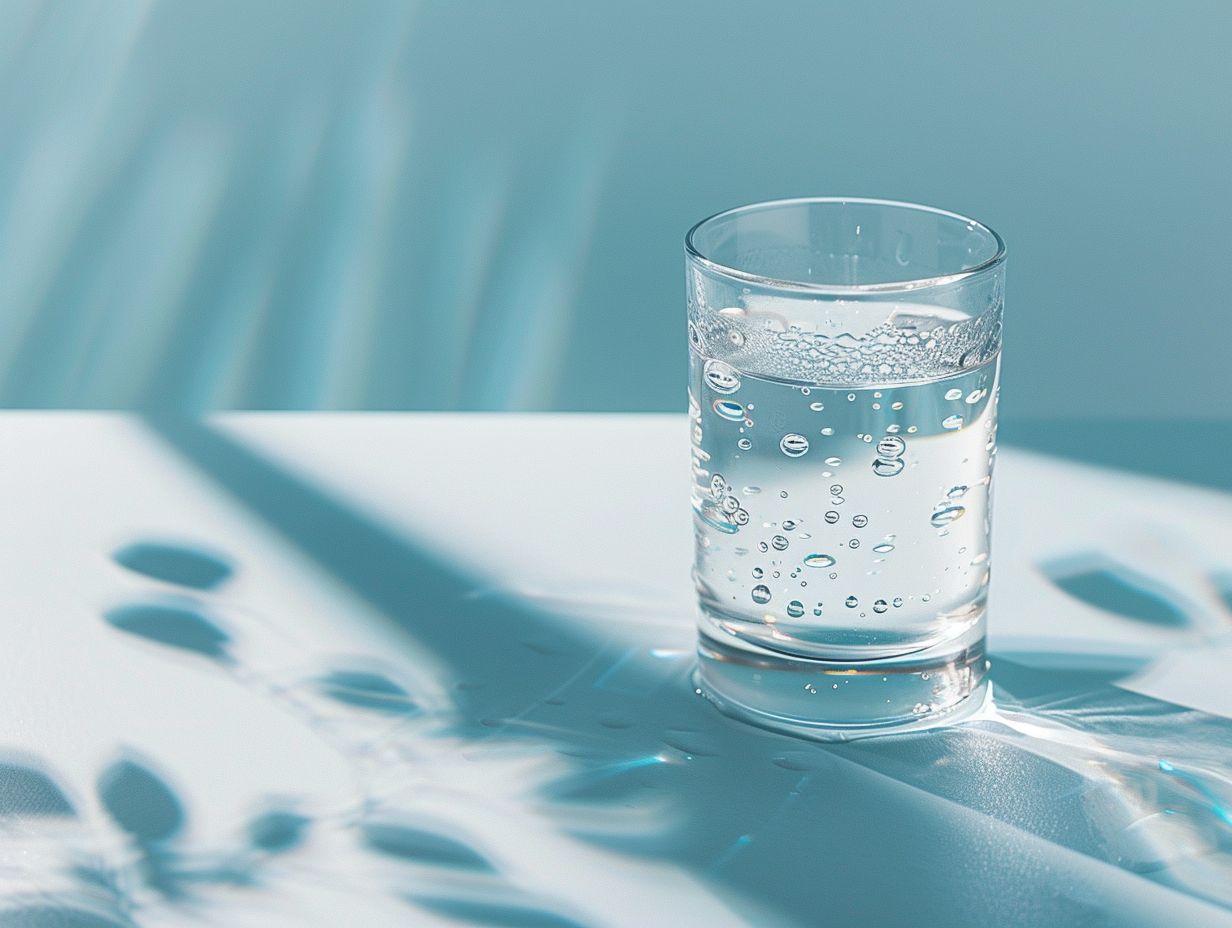
When ingested, essential oils can trigger allergic reactions due to their concentrated nature and potent properties. These reactions can manifest in various ways, such as nausea, vomiting, diarrhea, or even anaphylaxis in severe cases. It’s crucial to understand that not all essential oils are safe for internal use, and even those considered safe may still cause adverse reactions in susceptible individuals.
Individuals with known allergies or sensitivities should exercise caution when consuming oils, always conducting a patch test or consulting a healthcare professional beforehand. Proper dilution and moderation are essential to minimize the risk of allergic responses. Being informed about the specific properties and potential side effects of different oils is key to enjoying their benefits safely.
Interactions with Medications
Essential oils can interact with medications when ingested, potentially affecting their effectiveness or causing adverse effects. Understanding these interactions and taking appropriate precautions is crucial for safe consumption.
When essential oils are ingested, they can interfere with the absorption, metabolism, and excretion of certain medications, leading to unexpected reactions. It is essential to consult with a healthcare professional before incorporating hot water essential oils into your routine, especially if you are taking prescription medications.
Some oils, such as citrus oils, can increase photosensitivity and interact with certain drugs, increasing the risk of sunburn or skin irritation. Always dilute essential oils appropriately and start with a patch test to minimize the risk of allergic reactions or other adverse effects.
Toxicity
Ingesting essential oils in excessive amounts can lead to toxicity, causing harmful effects on the body, particularly the stomach and digestive system. Dilution and careful consideration of potency are key in avoiding toxicity risks.
Overconsumption of essential oils can have severe repercussions on one’s well-being, inducing symptoms such as nausea, vomiting, and even organ damage. It is imperative to dilute oils properly before use to mitigate the potential dangers associated with concentrated forms. Certain chemical compounds in essential oils, like menthol or eucalyptol, can escalate toxicity levels if not moderated correctly. Investing time in understanding the potency of various oils and how they interact with the body is essential for safe usage and to prevent adverse reactions that could jeopardize health.
How Can You Safely Use Essential Oils in Water?
To safely incorporate essential oils into water for consumption, it is essential to follow specific guidelines and safety measures to ensure the best possible experience and health benefits.
One crucial step in this process is to always opt for certified therapeutic-grade essential oils, ensuring their purity and quality. When selecting oils for consumption, prioritize those sourced from natural origins without any synthetic additives or fillers. It is also vital to pay close attention to the recommended dosage for each oil, as excessive ingestion can have adverse effects. It is advisable to consult with a qualified aromatherapist or healthcare professional before ingesting essential oils, especially if you have any underlying health conditions or are pregnant.
Consult a Doctor
Before incorporating essential oils into your water regimen, it is advisable to consult with a healthcare provider or aromatherapist to ensure compatibility with your body and health needs.
Professional advice is essential when considering internal use of essential oils due to their concentrated nature and potential effects on the body. Your healthcare provider or a certified aromatherapist can offer personalized guidance, taking into account your medical history, current medications, and any underlying health conditions. They can help determine appropriate dosage, application methods, and potential interactions to prevent any adverse reactions. By seeking expert advice, you can ensure a safe and effective integration of essential oils into your wellness routine.
Dilute the Essential Oil
Properly diluting essential oils before adding them to water is crucial to prevent stomach irritation and other adverse effects of ingesting concentrated or potent oils.
Dilution plays a key role in ensuring the safe consumption of essential oils, especially when incorporating them into water-based beverages or recipes. When using essential oils internally, it’s important to follow dilution ratios recommended by experts to minimize the risk of potential adverse reactions.
A common dilution guideline is one to two drops of essential oil per ounce of a carrier oil or water-based beverage. For a more precise dilution, you can refer to a dilution chart based on the specific essential oil you are using.
Use High-Quality Essential Oils

Selecting high-quality essential oils from reputable companies ensures that you are ingesting safe and effective products that offer the intended health benefits without harmful additives or contaminants.
Regarding choosing premium essential oils for consumption, it is crucial to look for oils that are pure, organic, and minimally processed. The quality of essential oils is determined by factors such as the source of the plants, extraction method, and third-party testing for purity and potency. Established brands often prioritize these aspects to provide oils in drinks. Always check the label for details like botanical names, country of origin, and precautions for use. Trusted brands invest in research and ensure that their products meet industry standards and regulations. Prioritizing quality over cost when selecting essential oils is essential for reaping their health and wellness benefits.
Frequently Asked Questions
Can You Put Essential Oils in Your Water to Drink?
Yes, you can put essential oils in your water to drink. However, it is important to do so safely and with caution.
Is it safe to put essential oils in water?
It depends on the type of essential oil and the amount you use. Some essential oils are safe to ingest, while others are not. Always do your research and consult with a healthcare professional before consuming essential oils.
What are the benefits of drinking water with essential oils?
Drinking water with essential oils can provide various health benefits, such as improving digestion, boosting the immune system, and promoting relaxation. It can also add a refreshing flavor to your water.
Which essential oils are safe to put in water?
Some safe essential oils to put in water include citrus oils like lemon or orange, peppermint, and lavender. Again, it is crucial to research the safety and dosage of each essential oil before consuming it.
How much essential oil should I put in my water?
The amount of essential oil you should put in your water depends on the type of oil and your personal tolerance. It is generally recommended to start with a small amount, such as 1-2 drops, and gradually increase if needed.
What are the potential risks of drinking water with essential oils?
Consuming essential oils in large amounts or the wrong type of oil can lead to potential side effects such as nausea, vomiting, and even liver damage. Always use caution and consult with a healthcare professional before ingesting essential oils.

